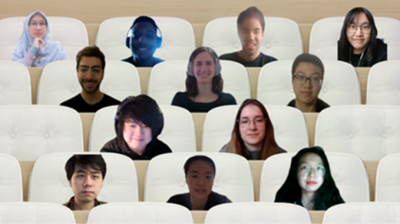Developing Education Technologies for Universities with Microsoft during Covid-19
8 July 2021
Student Engagement Series: Developing Education Technologies for Universities with Microsoft during Covid-19

During the Covid pandemic, UCL Computer Science students looked at the engagement of students online. The following two case studies were undertaken by UCL CS Postgraduate (MSc Software Systems Engineering), and Undergraduate Computer Science students.
UCL Online Register for Classes with Analytics (UCL ORCA)

Image: UCL Orca team (from top left to right).Emeralda Sesari, Khesim Reid, Arzhan Tong, Xinyuan Zhuang, Omar Beyhum, Lydia Tsami, Yanke Zhang, Chon Ng, Elena Aleksieva, Zisen Lin, Yang Fan, Yifei Zhao from MSc Software Systems Engineering.
Online Register for Classes with Analytics (ORCA) was a project initiated by 12 MSc Software Systems Engineering students working with Microsoft. Their goal was to design software to complement the online learning, and collaboration tools of schools and universities, most notably, Moodle and Microsoft Teams. Ultimately, this innovation allowed teachers to see visual reports based on student attendance and engagement metrics.
Lydia Tsami and Omar Beyhum represented the team whilst interviewed by Microsoft developer, Ayca Bas from the Microsoft 365 team. A live demonstration took place, where the students explored their motivations for the project. Omar stated how the group was driven to aid lecturers during the transition to online teaching after Covid 19 disrupted academic learning worldwide. The team noted that without everyone being located on campus, keeping track of attendance and checking that every student is gaining the right amount of attention needed, becomes difficult to manage. Omar further explained how it is increasingly hard to quantify how engaged students are with the online material.
“A lot of institutions in the UK have struggled to know how they should design their online learning material, whether they should focus more on live lectures via video conferencing, or maybe have more pre-recorded lectures that students can go through on their own time. The purpose of ORCA is that we need to help visualise and synthesise all of this data that you can collect from how students engage with online content.” - Omar Beyhum
With student engagement at the heart of the issue, the ORCA team conducted surveys to understand and highlight target areas that needed addressing; this lead to their creation of ORCA.
ORCA allows institutions to gain insights into students' attendance and engagement with online platforms. To accomplish this, the ORCA system has published open source components for the integration of Moodle with Microsoft Graph.
These two external systems send out notifications to ORCA whenever students interact with Moodle and Microsoft Teams respectively. ORCA then standardises the incoming information into a common format and stores it on SharePoint lists, to which the relevant teaching and learning administration staff can gain access to check attendance.
ORCA also gives the option to store student engagement data into a database, which can be exposed to the Power BI dashboarding service and embedded into SharePoint, allowing staff to visualise how students interact with online content.
UCL Resourcium Student Engagement App
UCL Resourcium is the result of a student team project aiming to provide as much help as possible to students online through a student facing cross-platform app that connects to sharepoint based resources including the ORCA project. Undergraduate second year Computer Science students Hemil Shah, Louis De Wardt and Pritika Shah worked together in a team alongside Microsoft to develop the tool throughout the Covid Pandemic. The solution was presented to and recorded by the Microsoft 365 team in Redmond.
The team quickly highlighted that most universities are now placing a strong emphasis on using a SharePoint site as the means of data storage, as well as a dashboard on the SharePoint site to view this data for analysis. The students then sought out ways in which students can be supported in their education beyond the provisioning of resources. This is an issue faced by many universities especially during the pandemic, so the team was motivated to make the system design an open-sourced scaffolded project for any institution across the globe to use and built upon.
““Our project provides the basis of a new paradigm of university-centric app platforms. It solves the problem of engagement on two fronts that lecturers and other teaching staff have encountered as they adapt to online and remote learning. The first is that it provides students with direct access to information that universities already had but struggled to publicise. Secondly, it provides a whole new means of understanding engagement with lectures.”
– UCL Resourcium app team statement
The UCL Resourcium app enables engagement to be measured when elected through the class register connectivity provided in the ORCA project architecture. As a student facing app, it uses forms pages for enquiries, has linked sharepoint-driven information pages that teaching teams can easily update, and a Q&A chatbot that grows over time to help students with queries whilst simultaneously building valuable data for lecturers to see students needs. The forms page is host to several forms that universities can configure to their needs. The information pages also allow students to interact with several useful tools including Microsoft learn, LinkedIn Learning, and our Q&A chatbot on Microsoft Learn.
Key to the functionality of the UCL Resourcium app is centred around the teams work on the SharePoint integration layer. This is where the proof-of-concept app has developed helpful forms data, and a pilot test of capturing student stress levels. With GDPR views in mind, data can be elected to be monitored by the students. The data is compiled into a reporting system, where lecturers can use the data to see and manage student engagement.
When asked about challenges faced in developing this project over the Covid-19 pandemic, the student team highlighted their starting point, where two team members lacked web development experience, which took some time to learn. After working through this, the UCL Resourcium app team successfully developed a full Proof of Concept of the project, gaining a host of new skills and experience, in working online, and assisting each other with software development practices. They most especially are thrilled to have presented to senior developers at UCL Internet Services Division and professional SharePoint, Teams and Graph developers in the Microsoft 365 team in Redmond.
References:
Microsoft University College London IXN Project Resourcium - Microsoft Tech Community
Editorial: Selina Peerbux
 Close
Close

